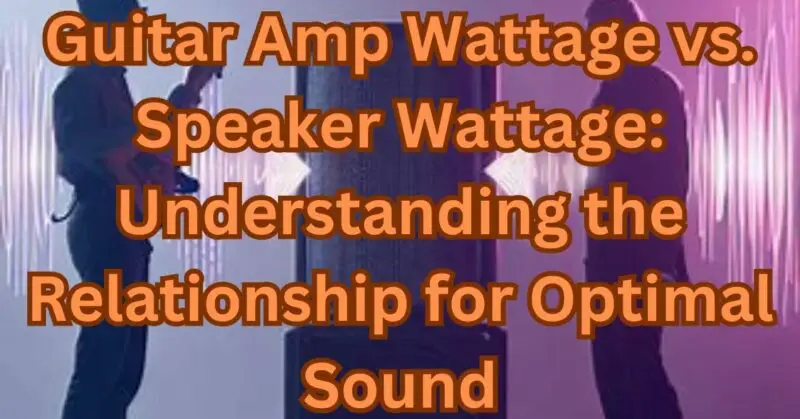In the world of guitar amplification, there is an essential interplay between the wattage of the amplifier and the wattage rating of the speaker. Understanding this relationship is crucial for achieving optimal sound quality, performance, and avoiding potential damage to your equipment. In this article, we will delve into the intricacies of guitar amp wattage and speaker wattage, exploring their connection and the factors to consider when matching them.
Understanding Guitar Amp Wattage
Guitar amplifier wattage refers to the amount of electrical power the amplifier can deliver to the speaker. It determines the volume and overall performance capabilities of the amp. Higher wattage amplifiers generally produce more volume and headroom, allowing for cleaner tones at higher volumes and the ability to drive larger speakers without distortion.
However, it is important to note that the wattage alone does not define the quality or tonal characteristics of an amplifier. Different amplifiers with the same wattage rating can produce varying tonal responses, depending on their design, components, and circuitry. It is crucial to consider these factors when selecting an amplifier to suit your playing style and tonal preferences.
Understanding Speaker Wattage
Speaker wattage refers to the power handling capacity of the speaker. It indicates the amount of power the speaker can effectively handle without risking damage or distortion. A speaker with a higher wattage rating can handle more power, allowing it to produce louder volumes and clearer sound reproduction.
It is essential to match the wattage of your amplifier to the wattage rating of your speaker. If the amplifier’s wattage exceeds the speaker’s handling capacity, it can lead to speaker damage or distortion, as the speaker is forced to operate beyond its limits. Conversely, an amplifier with significantly lower wattage than the speaker’s rating may not fully utilize the speaker’s potential, resulting in a potentially lackluster sound and restricted performance.
Finding the Right Match
To achieve the best possible sound and avoid equipment damage, it is crucial to find the right match between your amplifier and speaker wattage. Here are a few factors to consider:
1. Speaker Wattage Rating: Always check the wattage rating of your speaker, which is usually indicated on the speaker itself or in the user manual. Ensure that your amplifier’s wattage falls within the recommended power range specified by the speaker manufacturer.
2. Headroom and Volume: Consider your playing style, genre, and performance requirements. If you play in larger venues or require high headroom for clean tones, a higher wattage amplifier might be suitable. For home practice or smaller gigs, a lower wattage amp can provide ample volume and tone.
3. Matching Impedance: Impedance, measured in ohms, also plays a crucial role. Ensure that the impedance of your speaker matches the output impedance of your amplifier. Mismatched impedance can affect the power transfer and may result in poor sound quality or damage to your equipment.
4. Speaker Efficiency: Efficiency ratings indicate how effectively a speaker converts electrical power into sound. Higher efficiency speakers can produce more volume with the same wattage input, making them a suitable choice for low wattage amplifiers.
Conclusion
Finding the right balance between guitar amp wattage and speaker wattage is vital for achieving optimal sound quality, performance, and protecting your equipment from potential damage. It requires careful consideration of the wattage ratings, impedance matching, and efficiency of your amplifier and speaker.
Remember, wattage is not the sole determinant of tone and quality. The design, circuitry, and components of the amplifier and speaker also significantly impact the sound produced. Experimenting with different combinations of amp wattage and speaker wattage can help you discover unique tonal characteristics and find the perfect match for your musical style.
When in doubt, consulting with experienced professionals or seeking advice from reputable guitar stores can provide valuable insights and recommendations. They can guide you in selecting the ideal amp and speaker combination based on your specific needs and preferences.
It is worth noting that some guitarists intentionally mismatch amp and speaker wattage to achieve desired tonal effects. This technique, known as power scaling or power tube saturation, involves using a lower wattage amp with a higher wattage speaker or vice versa. This approach can result in harmonic distortion, compression, and a distinct vintage or overdriven sound that some players find desirable. However, it requires careful experimentation and monitoring to avoid damaging your equipment.
Lastly, as technology advances, there are now options available such as attenuators, load boxes, and speaker simulators that allow you to explore different wattage combinations without the risk of damaging your speaker or compromising sound quality. These devices can attenuate the output of a high wattage amp, enabling you to achieve desired tonal characteristics even at lower volumes.
In conclusion, understanding the relationship between guitar amp wattage and speaker wattage is essential for optimizing your sound and protecting your gear. By matching the wattage ratings, considering impedance, efficiency, and your specific requirements, you can achieve the best possible tone and performance. Remember to experiment and explore various combinations to find your unique sonic signature. Whether you prefer clean tones at high volumes or vintage overdriven sounds at lower volumes, finding the right amp and speaker combination will elevate your playing experience and bring your music to life.

